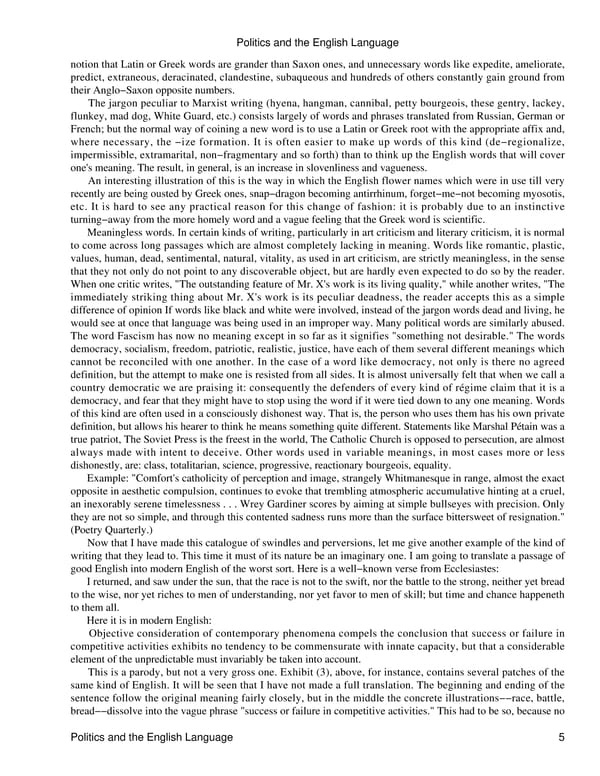Politics and the English Language notion that Latin or Greek words are grander than Saxon ones, and unnecessary words like expedite, ameliorate, predict, extraneous, deracinated, clandestine, subaqueous and hundreds of others constantly gain ground from their Anglo−Saxon opposite numbers. The jargon peculiar to Marxist writing (hyena, hangman, cannibal, petty bourgeois, these gentry, lackey, flunkey, mad dog, White Guard, etc.) consists largely of words and phrases translated from Russian, German or French; but the normal way of coining a new word is to use a Latin or Greek root with the appropriate affix and, where necessary, the −ize formation. It is often easier to make up words of this kind (de−regionalize, impermissible, extramarital, non−fragmentary and so forth) than to think up the English words that will cover one's meaning. The result, in general, is an increase in slovenliness and vagueness. An interesting illustration of this is the way in which the English flower names which were in use till very recently are being ousted by Greek ones, snap−dragon becoming antirrhinum, forget−me−not becoming myosotis, etc. It is hard to see any practical reason for this change of fashion: it is probably due to an instinctive turning−away from the more homely word and a vague feeling that the Greek word is scientific. Meaningless words. In certain kinds of writing, particularly in art criticism and literary criticism, it is normal to come across long passages which are almost completely lacking in meaning. Words like romantic, plastic, values, human, dead, sentimental, natural, vitality, as used in art criticism, are strictly meaningless, in the sense that they not only do not point to any discoverable object, but are hardly even expected to do so by the reader. When one critic writes, "The outstanding feature of Mr. X's work is its living quality," while another writes, "The immediately striking thing about Mr. X's work is its peculiar deadness, the reader accepts this as a simple difference of opinion If words like black and white were involved, instead of the jargon words dead and living, he would see at once that language was being used in an improper way. Many political words are similarly abused. The word Fascism has now no meaning except in so far as it signifies "something not desirable." The words democracy, socialism, freedom, patriotic, realistic, justice, have each of them several different meanings which cannot be reconciled with one another. In the case of a word like democracy, not only is there no agreed definition, but the attempt to make one is resisted from all sides. It is almost universally felt that when we call a country democratic we are praising it: consequently the defenders of every kind of régime claim that it is a democracy, and fear that they might have to stop using the word if it were tied down to any one meaning. Words of this kind are often used in a consciously dishonest way. That is, the person who uses them has his own private definition, but allows his hearer to think he means something quite different. Statements like Marshal Pétain was a true patriot, The Soviet Press is the freest in the world, The Catholic Church is opposed to persecution, are almost always made with intent to deceive. Other words used in variable meanings, in most cases more or less dishonestly, are: class, totalitarian, science, progressive, reactionary bourgeois, equality. Example: "Comfort's catholicity of perception and image, strangely Whitmanesque in range, almost the exact opposite in aesthetic compulsion, continues to evoke that trembling atmospheric accumulative hinting at a cruel, an inexorably serene timelessness . . . Wrey Gardiner scores by aiming at simple bullseyes with precision. Only they are not so simple, and through this contented sadness runs more than the surface bittersweet of resignation." (Poetry Quarterly.) Now that I have made this catalogue of swindles and perversions, let me give another example of the kind of writing that they lead to. This time it must of its nature be an imaginary one. I am going to translate a passage of good English into modern English of the worst sort. Here is a well−known verse from Ecclesiastes: I returned, and saw under the sun, that the race is not to the swift, nor the battle to the strong, neither yet bread to the wise, nor yet riches to men of understanding, nor yet favor to men of skill; but time and chance happeneth to them all. Here it is in modern English: Objective consideration of contemporary phenomena compels the conclusion that success or failure in competitive activities exhibits no tendency to be commensurate with innate capacity, but that a considerable element of the unpredictable must invariably be taken into account. This is a parody, but not a very gross one. Exhibit (3), above, for instance, contains several patches of the same kind of English. It will be seen that I have not made a full translation. The beginning and ending of the sentence follow the original meaning fairly closely, but in the middle the concrete illustrations−−race, battle, bread−−dissolve into the vague phrase "success or failure in competitive activities." This had to be so, because no Politics and the English Language 5
 George Orwell | Politics and the English Language Page 7 Page 9
George Orwell | Politics and the English Language Page 7 Page 9